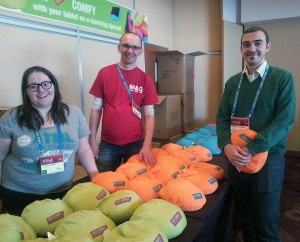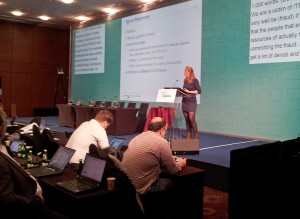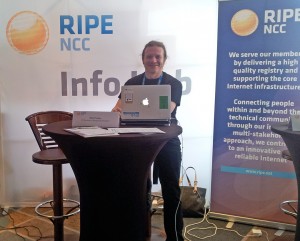Wednesday’s sessions opened with a healthy dose of debate in the various sessions around topics ranging from policy to DNS.
 The Address Policy Working Group addressed personal identification, discussing what level of due diligence should be required when verifying resource holders. The working group also discussed an issue with 16-bit ASNs being returned that are still referenced in the RIPE Database, which has prevented the RIPE NCC from reassigning those resources. This inspired actions from both Wilfried Woeber, Univie/ACOnet/VIX, who agreed to take this to the Database Working Group to try and find a solution in order to perform a clean-up, and to the Address Policy Working Group, which decided to draft a statement to the IETF, urging them to standardise the use of 32-bit BGP communities.
The Address Policy Working Group addressed personal identification, discussing what level of due diligence should be required when verifying resource holders. The working group also discussed an issue with 16-bit ASNs being returned that are still referenced in the RIPE Database, which has prevented the RIPE NCC from reassigning those resources. This inspired actions from both Wilfried Woeber, Univie/ACOnet/VIX, who agreed to take this to the Database Working Group to try and find a solution in order to perform a clean-up, and to the Address Policy Working Group, which decided to draft a statement to the IETF, urging them to standardise the use of 32-bit BGP communities.
Marco Schmidt was welcomed into his role as the Policy Development Officer for the RIPE NCC. Marco and Jan Zorz, Internet Society, reported back in the second session of the Address Policy Working Group on their investigation into ambiguous language in policy documents. The group discussed how to clear up any ambiguity while preserving the original intention of the policy (for example, “should” intending to mean “must”). The working group decided to deal with the issue with a policy proposal.
Sandra Brown, IPv4 Market Group, announced her intention to draft a new proposal that would allow for inter-RIR transfers of IPv4 address space. When transferring resources to another RIR, the RIPE NCC would work with the destination RIR to allow the transfer and will work with the originating RIR in reverse cases. The existing legacy proposal would apply to legacy space that is transferred. This proposal hasn’t been entered into the PDP yet.
 The DNS Working Group saw a number of presentations about measuring DNSSEC deployments using various measurement methodologies and systems. The monitoring of DNS infrastructure was also a hot topic, with an analysis of Turkey’s recent actions towards Google’s DNS services, a description of changes to the RIPE NCC DNSMON service, and a panel discussion about how statistics collection and DNS monitoring could potentially be standardised.
The DNS Working Group saw a number of presentations about measuring DNSSEC deployments using various measurement methodologies and systems. The monitoring of DNS infrastructure was also a hot topic, with an analysis of Turkey’s recent actions towards Google’s DNS services, a description of changes to the RIPE NCC DNSMON service, and a panel discussion about how statistics collection and DNS monitoring could potentially be standardised.
There were mixed responses to improvements suggested for making the RIPE Database more intuitive, especially for new users, and the Database Working Group Chair suggested holding an open meeting in Amsterdam before the next RIPE Meeting for anyone interested in the future development of the RIPE Database.
 During the RIPE NCC Services Working Group session, RIPE NCC Director of External Relations Paul Rendek gave a (virtual) introduction to the RIPE NCC’s new staff members in Dubai and Moscow. Piotr Strzyżewski, Silesian University of Technology, Computer Centre, gave a presentation that asked the question, “Do we need more auditing of RIPE NCC projects?” The question led to a good discussion about the value of the RIPE Atlas project and how processes might be improved to ensure the fewest number of “lost” probes possible.
During the RIPE NCC Services Working Group session, RIPE NCC Director of External Relations Paul Rendek gave a (virtual) introduction to the RIPE NCC’s new staff members in Dubai and Moscow. Piotr Strzyżewski, Silesian University of Technology, Computer Centre, gave a presentation that asked the question, “Do we need more auditing of RIPE NCC projects?” The question led to a good discussion about the value of the RIPE Atlas project and how processes might be improved to ensure the fewest number of “lost” probes possible.










